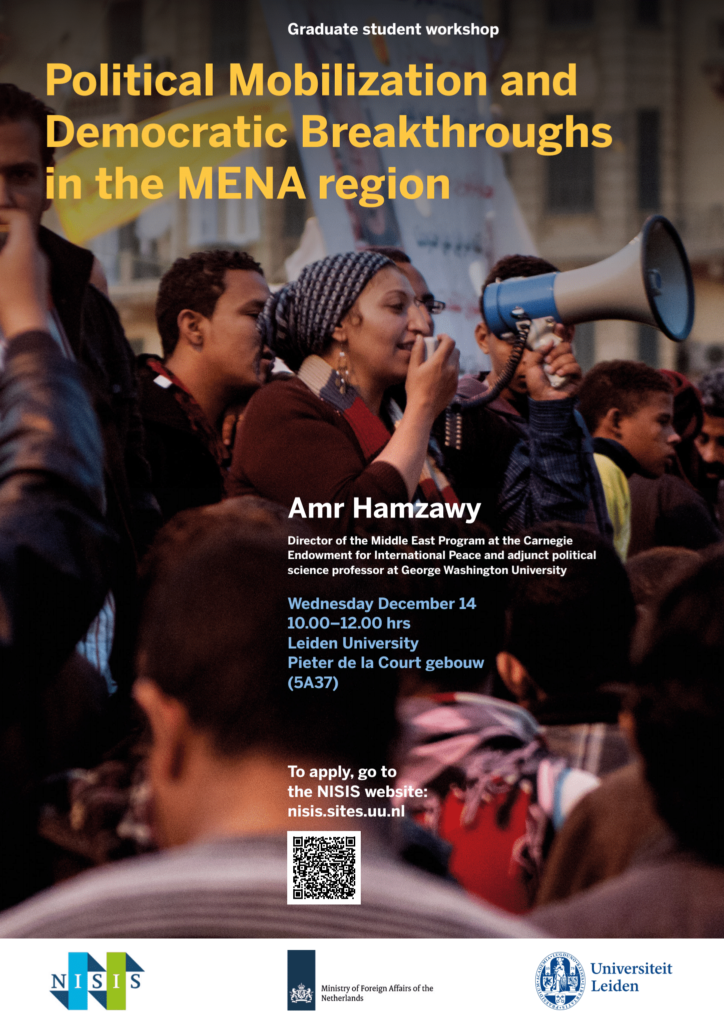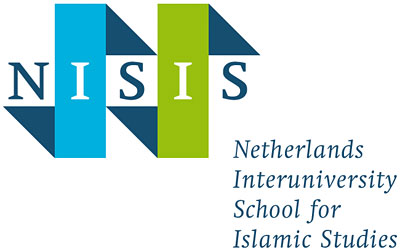Agenda
Workshop ‘Political Mobilization and Democratic Breakthroughs’ – 14 December 2022
This workshop is organised in close collaboration with Leiden University and the Dutch Ministry of Foreign Affairs.

Location: Pieter de la Court Building, 5A37, Leiden University
Instructor: Amr Hamzawy (Amr.hamzawy@ceip.org)
Date: 14 December 2022
Time: 10.00-12.00 (followed by a light lunch for all participations, 12.00-13.30)
ECTS: students can earn 1 ECTS by actively participating in this study day.
Mass politicisation mobilisation occurs in both democracies and autocracies. Sometimes political protests, demonstrations and acts of non-violent civic resistance undermine autocracies, produce democratic breakthroughs, or generate democratic reforms. Other times, they do not. This workshop explores, with a focus on the Middle East and North Africa (MENA), why, first examining the original causes of mobilization, some movements succeed and others fail.
The first session of the workshop will review theories of revolution, social movements, and democratization. The second session will dive into MENA case studies.
MA-students, RMA-students and PhD-candidates who would like to participate are kindly requested to upload a motivation letter here by Monday 5 December 2022 12:00 pm.
Based on their motivation letters, 25 participants will be selected. They will receive the required and optional literature on 5 December 2022 (in the afternoon/ evening) and they will then be asked to submit two questions for Prof. Hamzawy, which should be sent to nisis@uu.nl by 11 December 2022.
Speaker
Amr Hamzawy is the director of the Middle East Programme at the Carnegie Endowment for International Peace in Washington, DC. He studied political science and developmental studies in Cairo, The Hague, and Berlin. In the coming years, Amr Hamzawy will also teach at George Washington University in Washington DC. He was previously an associate professor of political science at Cairo University and a professor of public policy at the American University in Cairo. Hamzawy’s research, teaching interests as well as academic publications focus on democratisation processes in Egypt, governance in the Arab world, and contemporary debates in Arab political thought. His recent book ‘Struggles for Political Change in the Arab World’ was published in October 2022.
Required readings
Session One: Structural, Agency, and International Factors’ Theories
Students are required to read at least 50 pages of the following publications:
– Seva Gunitsky, “From Shocks to Waves: Hegemonic Transitions and Democratization in the Twentieth Century,” International Organization 68, no. 3 (Summer 2014): 561-97.
– Stephan Haggard and Robert R. Kaufman, “Inequality and Transitions to Democracy,” in Dictators and Democrats: Masses, Elites, and Regime Change (Princeton: Princeton University Press, 2016), 29-58.
– Jean Lachapelle, Steven Levitsky, Lucan A. Way, and Adam E. Casey, “Social Revolution and Authoritarian Durability,” World Politics 72, no. 4 (October 2020): 557-600.
– Seymour Martin Lipset, “Some Social Requisites of Democracy: Economic Development and Political Legitimacy,” American Political Science Review 53, no. 1 (March 1959): 69–105.
– Michael McFaul, “The Missing Variable: The ‘International System’ as the Link between the Third and Fourth Wave Models of Democratization,” in Valerie Bunce, Michael McFaul, and Kathryn Stoner-Weiss, eds., Democracy and Authoritarianism in the Postcommunist World (New York: Cambridge University Press, 2009): 3-29.
– Daniel Treisman, “Democracy by Mistake: How the Errors of Autocrats Trigger Transitions to Freer Governments,” American Political Science Review 114, no. 3 (2020): 792-810.
Extra, optional readings:
– Rachel Beatty Riedl, Dan Slater, Joseph Wong, and Daniel Ziblatt, “Authoritarian-Led Democratization,” Annual Review of Political Science 23 (2020): 315-32.
– Carles Boix, “Democracy, Development, and the International System,” American Political Science Review 105, no. 4 (2011): 809-28.
– James Davies, “Toward a Theory of Revolution,” American Sociological Review 27, no. 1 (1962): 5-19.
– Yuriy Gorodnichenko and Gerard Roland, “Culture, institutions and democratization*,” Public Choice 187, no. 1 (2021): 165-95.
– Stephan Haggard and Robert R. Kaufman, “Democratization during the Third Wave,” Annual Review of Political Science 19 (2016): 125-44.
Session Two: Egypt, Tunisia and Sudan as Case Studies
Students are required to read at least 50 pages of the following publications:
– Eva Bellin, “The Puzzle of Democratic Divergence in the Arab World: Theory Confronts Experience in Egypt and Tunisia,” Political Science Quarterly 133, no. 3 (2018): 435-74.
– Amr Hamzawy, “Authoritarian Narratives and Practices in Today’s Egypt,” in Lisa Blaydes, Amr Hamzawy and Hesham Sallam, eds., Struggles for Political Change in the Arab World: Regimes, Oppositions, and External Actors after the Spring (Ann Arbor: University of Michigan Press, 2022).
– Khalid Mustafa Medani, “Understanding the Roots, Dynamics, and Potential of an Impossible Revolution: The Prospects and Challenges of Democratization in Sudan,” in Struggles for Political Change in the Arab World: Regimes, Oppositions, and External Actors after the Spring (Ann Arbor: University of Michigan Press, 2022).
– Peter Sluglett, “Understanding Recent Social and Political Developments in the Middle East and North Africa: A Personal Odyssey,” in Asaad al-Saleh, ed., Voices of the Arab Spring: Personal Stories From the Arab Revolutions (New York: Columbia University Press, 2015).
Extra, optional readings:
– Lisa Blaydes, Amr Hamzawy, and Hesham Sallam, eds., “Chapter 1,” in Struggles for Political Change in the Arab World: Regimes, Oppositions, and External Actors after the Spring (Ann Arbor: University of Michigan Press, 2022).
– Sharan Grewal, “Where Sudan Succeeded Where Algeria Failed,” Journal of Democracy 32, no. 4 (October 2021), https://muse.jhu.edu/article/815940.
– Amr Hamzawy, “Post 2013 Egypt: Declining Formal Politics and Resilient Social Activism,” in Suzi Mirgani, ed., Informal Politics in the Middle East (London: Hurst, 2021).
– Mai Hassan and Ahmed Kodouda, “Sudan’s Uprising: The Fall of A Dictator,” Journal of Democracy 30, no. 4 (October 2019): 89-103, https://www.journalofdemocracy.org/articles/sudans-uprising-the-fall-of-a-dictator/.
– Abdelsalam Mahmoud, “Social Movements in Tunisia and Egypt: A Tale of Two Revolutions,” International Journal of Social Science Studies 3, no. 3 (May 2015): 8-20.
– Peter J. Schraeder and Hamadi Redissi, “The Upheavals in Egypt and Tunisia: Ben Ali’s Fall,” Journal of Democracy 22, no. 3 (July 2011): 5-19, https://muse.jhu.edu/article/444754/pdf.
– Lucan Way, “Comparing the Arab Revolts: Lessons of 1989,” Journal of Democracy 22, no. 4 (October 2011): 13-


